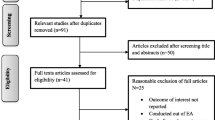Abstract
Purpose
Health professional organizations recommend exclusive breastfeeding for 6 months, but there are mothers, such as those with a history of breast cancer, who are unable to exclusively provide their milk for their infants. Minimal research has been published on mothers’ experience with lactation, breastfeeding, and bottle-feeding after breast cancer. This study explored mothers’ perspectives of infant feeding after a history of breast cancer.
Methods
Qualitative interviews were completed with 20 mothers who had experience with infant feeding after breast cancer, including exclusive breastfeeding, partial provision of human milk with formula supplementation, and exclusive formula feeding.
Results
Mothers shared their perceptions, barriers, and experiences of infant feeding. Four themes were identified: miracle of motherhood after breast cancer, medical misinformation or no available information contributing to the exacerbation of mothers’ worries, post-breast-cancer feeding challenges, and desire for infant-feeding support rather than pressure.
Conclusions
Mothers who have had breast cancer and have since given birth face specific challenges to infant feeding which are compounded by limited resources and knowledge among healthcare providers. Findings of the study highlight the importance of healthcare professionals becoming more educated to provide adequate support and evidence-based information on lactation and infant feeding for women with a history of breast cancer.
Implications for Cancer Survivors
Understanding the experiences of women who have given birth after breast cancer can help women in similar situations know that they are not alone, identify resources, access peer support, and seek evidence-based infant feeding advice from healthcare providers involved in their care.
Similar content being viewed by others
References
De Simone V, Pagani O. Pregnancy after breast cancer: hope after the storm. Minerva Ginecol. 2017;69(6):597–607.
Schmidt R, Richter D, Sender A, Geue K. Motivations for having children after cancer - a systematic review of the literature. Eur J Cancer Care. 2016;25:6–17.
Stopenski S, Aslam A, Zhang X, Cardonick E. After chemotherapy treatment for maternal cancer during pregnancy, is breastfeeding possible? Breastfeed Med. 2017;12(2):91–7.
Leal SC, Stuart SR, Carvalho HA. Breast irradiation and lactation: a review. Expert Rev Anticancer Ther. 2013;13(2):159–64.
Bhat S, Orucevic A, Woody C, Heidel RE, Bell JL. Evolving trends and influencing factors in mastectomy decisions. Am Surg. 2017;83(3):233–8.
Pagani O, Azim H. Pregnancy after breast cancer: myths and facts. Breast Care. 2012;7(3):210–4.
Lambertini M, Kroman N, Ameye L, Cordoba O, Pinto A, Benedetti G, et al. Long-term safety of pregnancy following breast cancer according to estrogen receptor status. J Natl Cancer Inst. 2018;110(4):426–9.
Moran MS, Colasanto JM, Haffty BG, Wilson LD, Lund MW, Higgins SA. Effects of breast-conserving therapy on lactation after pregnancy. Cancer J. 2005;11:399–403.
Connell S, Patterson C, Newman B. A qualitative analysis of reproductive issues raised by young Australian women with breast cancer. Health Care Women Int. 2006;27:94–110.
Gorman JR, Usita PM, Madlensky L, Pierce JP. A qualitative investigation of breast cancer survivors’ experiences with breastfeeding. J Cancer Surviv. 2009;3:181–91.
American Academy of Pediatrics. Breastfeeding and the use of human milk. Pediatrics. 2012;129:e827–41.
Tomori C, Palmquist AEL, Dowling S. Contesting moral landscapes: negotiating breastfeeding stigma in breastmilk sharing, nighttime breastfeeding, and long-term breastfeeding in the U.S. and the U.K. Soc Sci Med. 2016;168:178–85.
Davidsen AS. (2013). Phenomenological approaches in psychology and health sciences. Qual Res Psychol. 2013;10:318–39.
Braun M, Hasson-Ohayon I, Perry S, Kaufman B, Uziely B. Motivation for giving birth after breast cancer. Psychooncology. 2005;14(4):282–96.
Rosenberg SM, Gerlber S, Gelber RD, Krop E, Korde LA, Pagani O, et al. Oncology physicians’ perspectives on practices and barriers to fertility preservation and the feasibility of a prospective study of pregnancy after breast cancer. J Adolesc Young Adult Oncol. 2017;6(3):429–34.
Garner CD, Ratcliff SL, Thornburg LL, Wethington E, Howard CR, Rasmussen KM. Discontinuity of breastfeeding care: “There’s no captain of the ship.”. Breastfeed Med. 2016;11(1):32–9.
Sigman-Grant M, Kim Y. Breastfeeding knowledge and attitudes of Nevada health care professionals remain virtually unchanged over 10 years. J Hum Lact. 2016;32(2):350–4.
Esselmont E, Moreau K, Aglipay M, Pound CM. Residents’ breastfeeding knowledge, comfort, practices, and perceptions: results of the breastfeeding resident education study (BRESt). BMC Pediatr. 2018;18(1):1–7.
Crossley ML. Breastfeeding as a moral imperative: an autoethnographic study. Fem Psychol. 2009;19(1):71–87.
Ladores S, Aroian K. First-time mothers with a history of infertility: their internalized pressure to breastfeed. J Hum Lact. 2015;31(3):504–10.
Acknowledgments
The authors thank the mothers who participated in the study and shared their experiences.
Funding
IC received funding from Ohio University to conduct the study.
Author information
Authors and Affiliations
Corresponding author
Ethics declarations
Ethical standards
All procedures performed in studies involving human participants were in accordance with the ethical standards of the institutional and/or national research committee and with the 1964 Helsinki declaration and its later amendments or comparable ethical standards.
Conflict of interest
Author IC declares that she has no conflict of interest. Author JW declares that she has no conflict of interest. Author SB declares that she has no conflict of interest. Author EW declares that she has no conflict of interest.
Informed consent
Informed consent was obtained from all individual participants included in the study.
Additional information
Publisher’s note
Springer Nature remains neutral with regard to jurisdictional claims in published maps and institutional affiliations.
Rights and permissions
About this article
Cite this article
Azulay Chertok, I.R., Wolf, J.H., Beigelman, S. et al. Infant feeding among women with a history of breast cancer. J Cancer Surviv 14, 356–362 (2020). https://doi.org/10.1007/s11764-019-00852-z
Received:
Accepted:
Published:
Issue Date:
DOI: https://doi.org/10.1007/s11764-019-00852-z




